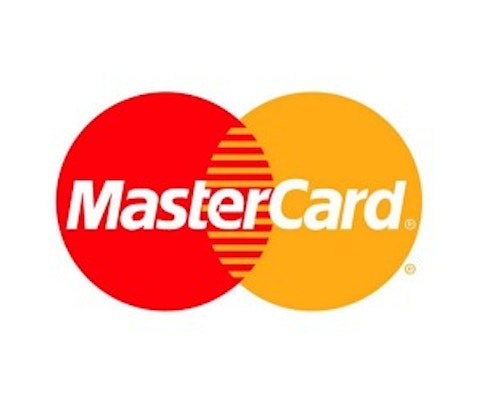
A Fast Growing Year With Increasing Cash Return
At the end of January the company reported an impressive full year 2012 results. Total revenue experienced a 10% growth to $7.4 billion, while the net income increased 15% to $2.76 billion. EPS came in at $22.04, a year-over-year growth of 18%. In terms of operating performance, the processed transaction, gross dollar volume, and cross-border volume all experienced double-digit growth of 25%, 15%, and 16%, respectively. In 2012, the company bought back 4.1 million shares for around $1.7 billion.
Mastercard remained a debt-free company. As of December 2012, MasterCard had nearly $6.93 billion in equity, more than $2 billion in cash, and no debt. To return more cash to its shareholders, MasterCard decided to double its quarterly dividend to 60 cents per share and buy back up to $2 billion of the Class A common stock. Ajay Banga, the company’s president and CEO, commented: “Our strong financial performance allows us to increase the return of cash to shareholders through our dividend and share repurchase programs. We remain focused on executing our strategy and growing our business for the future.”
High Profitability and Rapid Expansion
Indeed, MasterCard has been cannibalizing itself for the last 5 years. The treasury stock amount has grown from $600 million in 2007 to more than $4.1 billion in 2012. In the same period, its free cash flow has increased significantly, from $613 million to more than $2.8 billion. Since 2009, MasterCard has delivered significantly high returns on equity, which fluctuated in the range of 34.4% – 53.9%. In 2012, the return on equity was nearly 40%. Looking forward, MasterCard will keep expanding its business in overseas markets across Asia/Pacific, the Middle East, and Africa. The locations of the company’s new contactless payment technology, MasterCard Paypass, has experienced a 28% year-over-year growth to nearly 700,000 merchant locations in 51 countries including Singapore, Australia, United Arab Emirates, Vietnam, etc.
Peers Comparison
MasterCard, with $2.43 trillion in total payments volume and more than 1 billion issued cards, is the second biggest card company in the world. The global leading position belongs to Visa Inc (NYSE: V), which processed nearly $3.77 trillion payments volume and issued 2.1 billion cards. American Express Company (NYSE: AXP) and Discover Financial Services (NYSE: DFS) ranked third and fourth, respectively. American Express has issued 97 million cards and processed $808 billion in payments volume, while Discover Financial issued 59 million cards and processed $114 billion payments. At the current trading price of $520 per share, MasterCard is worth more than $64.2 billion in the market. The market is valuing MasterCard at more than 17.24x forward P/E. Visa, with nearly $107 billion in market cap, is valued a bit more expensive, at 19x forward P/E. Discover Financial seems to be the cheapest among the four, with only 8.75x forward earnings valuation, while the forward P/E of American Express is 11.3x.
Foolish Takeaway
Visa and MasterCard are benefiting from the growing cashless transaction trend. There is still a lot of growth for both companies in emerging markets globally. Investors might surf the global trend towards cashless transactions by initiating long positions in both companies.
The article A Fast Growing Credit Card Company originally appeared on Fool.com and is written by Anh HOANG.